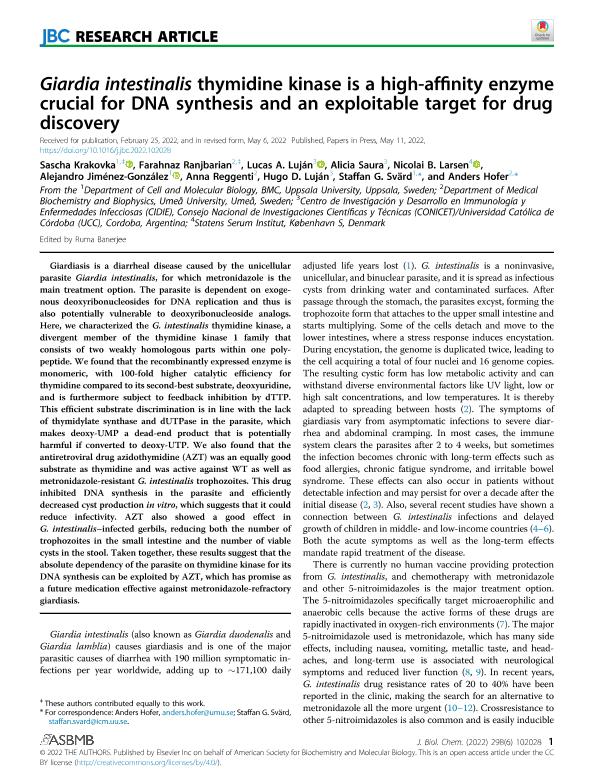Artículo
Giardia intestinalis thymidine kinase is a high-affinity enzyme crucial for DNA synthesis and an exploitable target for drug discovery
Krakovka, Sascha; Ranjbarian, Farahnaz; Luján, Lucas Agustín ; Saura, Alicia
; Saura, Alicia ; Larsen, Nicolai B.; Jiménez González, Alejandro; Reggenti, Anna; Lujan, Hugo Daniel
; Larsen, Nicolai B.; Jiménez González, Alejandro; Reggenti, Anna; Lujan, Hugo Daniel ; Svärd, Staffan G.; Hofer, Anders
; Svärd, Staffan G.; Hofer, Anders
 ; Saura, Alicia
; Saura, Alicia ; Larsen, Nicolai B.; Jiménez González, Alejandro; Reggenti, Anna; Lujan, Hugo Daniel
; Larsen, Nicolai B.; Jiménez González, Alejandro; Reggenti, Anna; Lujan, Hugo Daniel ; Svärd, Staffan G.; Hofer, Anders
; Svärd, Staffan G.; Hofer, Anders
Fecha de publicación:
06/2022
Editorial:
American Society for Biochemistry and Molecular Biology
Revista:
Journal of Biological Chemistry (online)
ISSN:
0021-9258
Idioma:
Inglés
Tipo de recurso:
Artículo publicado
Clasificación temática:
Resumen
Giardiasis is a diarrheal disease caused by the unicellular parasite Giardia intestinalis, for which metronidazole is the main treatment option. The parasite is dependent on exogenous deoxyribonucleosides for DNA replication and thus is also potentially vulnerable to deoxyribonucleoside analogs. Here, we characterized the G. intestinalis thymidine kinase, a divergent member of the thymidine kinase 1 family that consists of two weakly homologous parts within one polypeptide. We found that the recombinantly expressed enzyme is monomeric, with 100-fold higher catalytic efficiency for thymidine compared to its second-best substrate, deoxyuridine, and is furthermore subject to feedback inhibition by dTTP. This efficient substrate discrimination is in line with the lack of thymidylate synthase and dUTPase in the parasite, which makes deoxy-UMP a dead-end product that is potentially harmful if converted to deoxy-UTP. We also found that the antiretroviral drug azidothymidine (AZT) was an equally good substrate as thymidine and was active against WT as well as metronidazole-resistant G. intestinalis trophozoites. This drug inhibited DNA synthesis in the parasite and efficiently decreased cyst production in vitro, which suggests that it could reduce infectivity. AZT also showed a good effect in G. intestinalis?infected gerbils, reducing both the number of trophozoites in the small intestine and the number of viable cysts in the stool. Taken together, these results suggest that the absolute dependency of the parasite on thymidine kinase for its DNA synthesis can be exploited by AZT, which has promise as a future medication effective against metronidazole-refractory giardiasis.
Archivos asociados
Licencia
Identificadores
Colecciones
Articulos(CIDIE)
Articulos de CENTRO DE INV. Y DESARROLLO EN INMUNOLOGIA Y ENFERMEDADES INFECCIOSAS
Articulos de CENTRO DE INV. Y DESARROLLO EN INMUNOLOGIA Y ENFERMEDADES INFECCIOSAS
Citación
Krakovka, Sascha; Ranjbarian, Farahnaz; Luján, Lucas Agustín; Saura, Alicia; Larsen, Nicolai B.; et al.; Giardia intestinalis thymidine kinase is a high-affinity enzyme crucial for DNA synthesis and an exploitable target for drug discovery; American Society for Biochemistry and Molecular Biology; Journal of Biological Chemistry (online); 298; 6; 6-2022; 1-16
Compartir
Altmétricas



